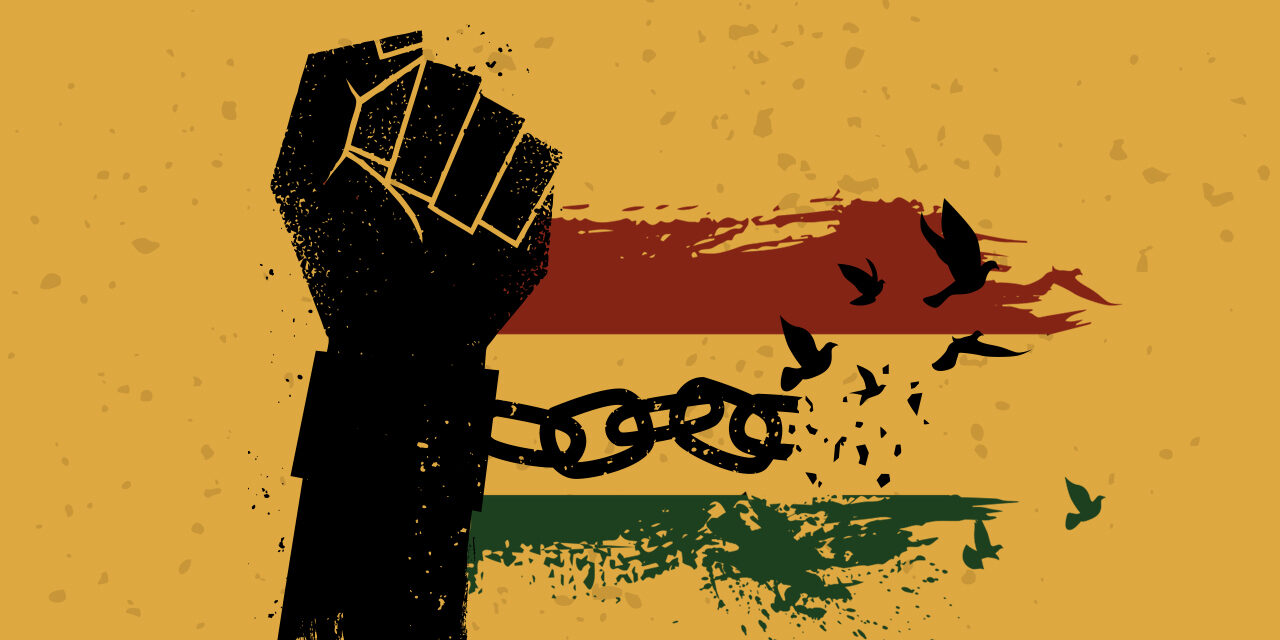
Robert Marshall
Robert Marshall, D.Min., is the lead pastor of the Los Angeles Community Church in Los Angeles, California. He also serves as the director of the African Heritage Network of the Free Methodist Church USA.
by Robert Marshall
Juneteenth is largely viewed as a federal holiday that Black folks celebrate to commemorate the ending of slavery in America. Instead, Juneteenth ought to be celebrated as a victory of the Christian abolitionist church movement. Abolitionists — justly seeking to end slavery in America — pursued the freedom of wrongfully enslaved and inhumanely treated Black people, because it was the right thing for Christian folks (including Free Methodists) and, more specifically, stewards of God to do.
I believe this provides some necessary illumination into God’s incredible hope for humanity. At the same time, it also provides a window into some critical character flaws of humankind. The flaws are visible. They are played out daily through the various power struggles that exist along racial lines and between godly and ungodly people.
In the opening chapter of Genesis, we are not only informed about how humanity was created, but also we learn that God blessed the people that He created in His own image, according to His own likeness and then endowed them with some authority on the earth. In verse 28, we are told that God said, “Be fruitful and multiply, and fill the earth, and subdue it; and rule over the fish of the sea and over the birds of the sky and over every living thing that moves on the earth” (NASB). It is here that we are first made aware of humanity’s struggle to recognize stewardship over rulership. Humanity’s preference is always rulership. Therefore, this challenge must not be viewed as the problem of the people long ago. It continues to be a challenge that plagues us today. People’s desire to be in charge, rulership, has led and still leads to all sorts of relationship issues.
What is the significance of Juneteenth?
Juneteenth harkens back to June 19, 1865, the day when federal troops arrived in Galveston, Texas, to take control of the state and ensure that all enslaved Black people would be freed. The troops’ arrival came a full two and a half years after the signing of the Emancipation Proclamation.
President Abraham Lincoln issued the Emancipation Proclamation on Jan. 1, 1863. The proclamation established that all enslaved Black people, remaining in rebellious Confederate states against the Union, “shall be then, thenceforward, and forever free.”
How was the Emancipation Proclamation critical to the existence of Juneteenth?
The reality about the Emancipation Proclamation was that it didn’t instantly free enslaved Blacks. It only applied to places under Confederate control, not to slave-holding border states or rebel areas already under Union control. Consequently, as Northern troops advanced into the Confederate South, many enslaved people fled behind Union lines.
_
“…slavery had continued to flourish in the state.”
_
In the absence of the Emancipation Proclamation, slavery remained relatively unaffected in Texas — until U.S. Gen. Gordon Granger stood on Texas soil and read General Orders, No. 3: “The people of Texas are informed that, in accordance with a proclamation from the Executive of the United States, all slaves are free.”
Because Texas was viewed as a haven for slavery, slavery had continued to flourish in the state. To understand why Texas remained unaffected by the newly enacted proclamation for so long, one needs to look no further than the lack of a significant presence of Union troops. As a result, many enslavers from outside the Lone Star State moved there.
Gen. Granger’s arrival in Galveston demonstrates the weight and authority this document carried everywhere it was presented. It single-handedly signaled freedom for 250,000 former Texan slaves, just as it had brought about previously for some 4 million slaves in 1863. Even though the war had concluded that June, emancipation didn’t happen overnight for everyone. In some cases, enslavers withheld the information until after harvest season. When word of Granger’s announcement spread, celebrations broke out among newly freed Blacks, and Juneteenth was born.
Can a legislative document truly be given credit for granting freedom?
Although the Emancipation Proclamation was a powerful document, a legislative document is nothing more than a piece of paper until its powers are enacted to enforce the moral and or political end that was intended. What is always true, however, is that it is impossible to legislate righteousness. Righteousness requires practice and one’s earnest pursuit of truth and justice. On the other hand, what often stands in the way of righteousness is the human struggle to choose stewardship to God over a desire to rule over everything and everyone in our world.
The Apostle John captures the idea behind these concepts when he says, “Little children, make sure no one deceives you; the one who practices righteousness is righteous, just as He is righteous; the one who practices sin is of the devil; for the devil has been sinning from the beginning. The Son of God appeared for this purpose, to destroy the works of the devil” (1 John 3:7–8 NASB).
A clear example of this struggle in 1865 was the fact that slavery remained relatively unaffected in Texas — and that Texas was viewed as a haven for slavery until Granger showed up. The ugly ungodliness that rulership insists upon severely compromises any hope of doing what is right. Furthermore, the longer the attitude of rulership is allowed to prevail over stewardship to God, the deeper ungodliness becomes entrenched in an existing culture and the graver human conditions become.
Graver conditions became apparent in 1877. This occurred because of the most closely contested presidential election in 1876. At the end of election day, no clear winner was determined because the outcomes in the swing states of South Carolina, Florida and Louisiana were unclear. Among other things, there were accusations of widespread voter fraud and tremendous bloodshed on both sides. However, both parties claimed victory in those states, but Republican-controlled “returning” boards would determine the official electoral votes. It should be noted that Republicans controlled the power to throw out any votes they deemed to be fraudulent. When parties were sent their own set of electors to certify the official votes, this caused a constitutional crisis, and a special election commission was established to determine the winner.
Democrats objected and threatened to use the filibuster. Eventually, a compromise was proposed and reached between Rutherford B. Hayes and Samuel Tilden. That compromise was an informal, unwritten deal that settled the dispute of the presidential election. The Republican, Rutherford B. Hayes was awarded the White House based on promises he made to Tilden and the Democrats, which ensured that he would not interfere with how Tilden and the Southern Dixiecrats went about re-establishing a White ruling class in the South. Hayes further agreed to remove federal troops from the swing states of South Carolina, Florida and Louisiana. This action ensured that in less than 10 years, there would be no more Black political representation found in the country.
_
“When people place rulership over their duty of stewardship to God, they seem to look at life as being a zero-sum game while being detached from any feelings of guilt or conviction of wrong.”
_
For Tilden’s part, he and his cronies waged an all-out campaign to systematically disenfranchise Black voters through poll taxes, literacy tests, and intimidation. This action ensured that in less than 10 years, there would be no more Black political representation found in the country.
Our modern world remains contentious. When people place rulership over their duty of stewardship to God, they seem to look at life as being a zero-sum game while being detached from any feelings of guilt or conviction of wrong. In other words, they must win and everyone else must lose. Strategy or philosophy cannot justify waging campaigns to systematically disenfranchise others whether through voter suppression, poll taxes, intimidation or bloodshed.
How can the pursuit of stewardship provide hope for the redemption and liberation of God’s people?
I believe that both hope, and redemption can be found for humanity through the lofty pursuit of stewardship to God. While we accurately point out based on Genesis 1:26 that human beings were created in the image of God, it is also true that we fail to finish the phrase. This is quite significant. The second part of the phrase informs us that we are also created according to His own likeness.
_
“God created human beings in His own image and according to His own likeness and gave us a measure of rulership.”
_
Some argue that the terms are synonymous, but I think that makes light of the character of God, which reveals what God is like. When we consider the character of God, we learn that He is holy, He is righteous, He is just and merciful among other things. Paul agrees when he writes in Ephesians 4:24 “to put on the new self, which in the likeness of God has been created in righteousness and holiness of the truth” (NASB). In addition, when we consider Jesus’ mission on earth, we find that it is summed up in stewardship to God. He says about Himself, “The Spirit of the Lord is upon Me, because He anointed Me to preach the gospel to the poor. He has sent Me to proclaim release to the captives, and recovery of sight to the blind, to set free those who are oppressed, to proclaim the favorable year of the Lord” (Luke 4:18–19 NASB).
God created human beings in His own image and according to His own likeness and gave us a measure of rulership. That authority had specific parameters. Our rulership is “over the fish of the sea and over the birds of the sky and over every living thing that moves on the earth.” Never were we granted the power to subjugate other people or show dominance over each other. There is a reason that God also created us according to His likeness. Being like God balances our tendency toward abusing power. In an article for The Earnest Christian, Free Methodist Church founder B.T. Roberts wrote in 1860:
“Open opposition to all wrong and injustice is another element of Scriptural righteousness. Many who will not do wrong themselves will countenance it, at least indirectly, in others. This is usually the first step towards a loss of virtue. He who, for the sake of party interest, personal friendship, or any other cause, is silent when he should reprove, will soon apologize for, then justify, then approve, and, if occasion serves, perpetuate the wrong from which, at first, his moral sensibilities revolted.”
Our 2019 Book of Discipline says it this way:
¶3221 Dignity and Worth of Persons
We are committed to the dignity and worth of all humans, including the unborn, regardless of gender, race, ethnicity, color, socio-economic status, disability, or any other distinctions (Acts 10:34-35) and will respect them as persons made in the image of God (Genesis 1:26-27) and redeemed by Christ’s death and resurrection.
The Old Testament law commands such respect (Deuteronomy 5:11-21). Jesus summarized this law as love for God and neighbor (Matthew 22:36-40). He ministered to all without distinction and His death on the cross was for all (John 3:16; Romans 5:8).
We are therefore pledged to active concern whenever human beings are demeaned, abused, depersonalized, enslaved or subjected to demonic forces in the world, whether by individuals or institutions (Galatians 3:28; Mark 2:27; 1 Timothy 1:8-10). We are committed to give meaning and significance to every person by God’s help. Remembering our tendency to be prejudicial, as Christians we must grow in awareness of the rights and needs of others.
Juneteenth must not only be a holiday that Black folks celebrate to commemorate the ending of slavery in America. It must be transformed into a day of a victory for the Christian abolitionist church movement. This movement valued the just pursuit of true freedom for wrongfully enslaved and inhumanely treated people, because it was the right thing for Christian folks — especially stewards of God — to do. +

Robert Marshall, D.Min.
Robert Marshall, D.Min., is the lead pastor of the Los Angeles Community Church in Los Angeles, California. He also serves as the director of the African Heritage Network of the Free Methodist Church USA.









